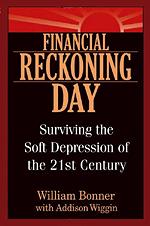If there is a real estate bubble in North America, it has not expanded out to Canada’s maritime provinces. Unlike the hot markets of California and New York, here in Nova Scotia, the property market is as cool as an abandoned corpse. Many houses appear to have not merely been taken off the market, but simply forgotten by it. Grass grows high on the lawns. Trees begin to poke through garage roofs. And prices?
Pity the poor man who tried to get rich leveraging property in the Annapolis Valley. On George Street, in Annapolis Royal, a realtor’s office offers what appears to be a nice 3-bedroom, two bath Victorian-era house near the center of town for only $129,000 — Canadian dollars. That’s less than $100,000 US dollars. Outside town, a farm of 130 acres, including a 4-bedroom, 2-bath house and several outbuildings, is offered for only $199,000 Canadian. The farm is situated on the neck of land between St. Mary’s bay to the east and the Bay of Fundy to the west — with frontage on both.
Nova Scotia must be the West Virginia of Canada. There is no sign of luxury or waste. People drive old cars, often old pick-up trucks with plenty of rust. If they are spending themselves deep into debt, there is no sign of it. Nor is there any need for it — they are already poor, or so it appears.
Then again, a man would have a hard time spending himself into the poorhouse around here; there is nothing to spend on. There are no luxury shops. The only entertainment is movies — shown only in the summer time and only on Thursday and Friday nights. The cafés in Annapolis Royal are modest. You’d have to eat a dozen meals a day to run up a decent tab. You can’t even get a cup of designer coffee.
"Do you have café latte," we asked.
"Nope."
"Do you have espresso?"
"No."
"How about cappuccino?"
"No."
"Well, what do you have?"
"Just regular coffee."
"Well, is it strong?"
"No."
"We’ll have tea."
One of the telltale marks of a returning American euro-snob is that he can’t bear American coffee. It tastes, say the French, like "sock juice." They regard it as not merely a sign of different tastes, but a sign of laxity — of a lack of discipline and rigor — a cultural failure. A character weakness. Serious people do not drink weak coffee, they believe.
We came up to Nova Scotia out of habit. When we lived in Maryland, we used to drive up for a week or two in the middle of July to escape the heat. This is also the homeland of Elizabeth’s grandparents… whom we came to visit every summer.
Though the grandparents have gone to their eternal rest, this area of Nova Scotia lives on unchanged. Instead, it is we who have changed. The place seems smaller, simpler, and more rustic than we remembered. Besides, Paris was chilly when we left. Here, it is even chillier; we get no sense of relief.
The weather here is often cold, even in July; yesterday, we sat around an open fire reading… hoping the sun would come out. Still, our family holds on to a sentimental attachment, like an old chair that came from a favorite aunt.
"In the United States," wrote de Tocqueville, "the more opulent citizens take great care not to stand aloof from the people; on the contrary, they constantly keep on easy terms with the lower classes: they listen to them, they speak to them every day. They know that the rich in democracies always stand in need of the poor; and that, in democratic times, you attach a poor man to you more by your manner than by benefits conferred."
Of course, the "democratic times" de Tocqueville saw were those of the republic’s humble beginnings. Today, America is an uneasy empire, with millions of opulent citizens in its debt-drenched homeland.
We note in passing that the rich have gotten a lot richer in recent years; their financial assets have gone up. The poor, meanwhile, have made no financial progress in more than 30 years. And as reported in this space just yesterday, last year merely extended the trend — real wages rose less fast than inflation.
 For the present, the rich and the poor are on speaking terms. But grievances are building up. Manufacturing jobs are disappearing. Instead of investing their money in new factories and new industries, the rich are putting their money overseas. Even Warren Buffett is moving cash offshore. Foreign holdings by High Net Worth Individuals doubled in 2003.
For the present, the rich and the poor are on speaking terms. But grievances are building up. Manufacturing jobs are disappearing. Instead of investing their money in new factories and new industries, the rich are putting their money overseas. Even Warren Buffett is moving cash offshore. Foreign holdings by High Net Worth Individuals doubled in 2003.
Meanwhile the poor indulge themselves in the illusions of consumer debt. As long as someone is willing to lend them money so they can buy a new SUV, they seem happy.
But interest rates are probably beginning an epic trend to the upside. And soon the sunny days of debt expansion will turn into the dark night of debt repayment — at higher rates. We don’t know exactly what will happen, but we doubt the poor will like it.
Bill Bonner [send him mail] is the author, with Addison Wiggin, of Financial Reckoning Day: Surviving the Soft Depression of The 21st Century.




